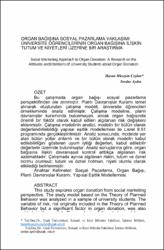| dc.contributor.author | Ceylan, Hasan Hüseyin | |
| dc.contributor.author | Aydın, Serdar | |
| dc.date | 2012 | |
| dc.date.accessioned | 2015-04-06T10:58:10Z | |
| dc.date.available | 2015-04-06T10:58:10Z | |
| dc.date.issued | 2012 | |
| dc.identifier.issn | 1302-1265 | |
| dc.identifier.uri | http://hdl.handle.net/11630/3672 | |
| dc.description.abstract | Bu çalışmada organ bağışı sosyal pazarlama perspektifinden ele
alınmıştır. Planlı Davranışlar Kuramı temel alınarak oluşturulan çalışma
modeli, üniversite öğrencileri örnekleminde analiz edilmiştir. Çalışma
modeline, planlı davranışlar kuramında bulunmayan, ancak organ bağışında
önemli bir faktör olarak kabul edilen algılanan risk değişkeni eklenmiştir.
Çalışma modelinin analizi, modelin bir bütün olarak değerlendirilebildiği
yapısal eşitlik modellemesi ile Lisrel 8.51 programında gerçekleştirilmiştir.
Analiz sonucunda; modelde yer alan bütün yollar anlamlı ve bir bütün olarak
modelin kabul edilebilirliğini gösteren uyum iyiliği değerleri, kabul edilebilir
değerlerin üzerinde bulunmuştur. Analiz sonuçlarına göre, organ bağışına
ilişkin davranışsal kontrol arttıkça algılanan risk azalmaktadır. Çalışmada
ayrıca algılanan riskin, tutum ve öznel normu olumsuz; tutum ve öznel
normun, niyeti olumlu olarak etkilediği belirlenmiştir. | en_US |
| dc.description.abstract | This study explores organ donation from social marketing
perspective. The study model based on the Theory of Planned Behavior was
analyzed in a sample of university students. The variable of risk, not
originally included in the Theory of Planned Behavior but a significant
factor in organ donation, was also added to the model. The analysis of the
study model was performed on Lisrel 8.51 by using structural equation
which enables the holistic assessment of the model. The analysis revealed that all paths in the model were meaningful and the goodness of fit values,
which illustrate the overall acceptability of the model, were above
acceptable levels. The results indicated that as behavioral control on organ
donation increases, perceived risk decreases. The results also revealed that
perceived risk negatively affects attitude and subjective norm, and attitude
and subjective norm positively affect intention of organ donation. | en_US |
| dc.language.iso | tur | en_US |
| dc.publisher | Afyon Kocatepe Üniversitesi | en_US |
| dc.rights | info:eu-repo/semantics/openAccess | en_US |
| dc.subject | Sosyal Pazarlama | en_US |
| dc.subject | Organ Bağışı | en_US |
| dc.subject | Planlı Davranışlar Kuramı | en_US |
| dc.subject | Yapısal Eşitlik Modellemesi | en_US |
| dc.title | Organ Bağışına Sosyal Pazarlama Yaklaşımı: Üniversite Öğrencilerinin Organ Bağışına İlişkin Tutum ve Niyetleri Üzerine Bir Araştırma | en_US |
| dc.title.alternative | Social Marketing Approach to Organ Donation: A Research on the Attitudes and Intentions of University Students about Organ Donation | en_US |
| dc.type | article | en_US |
| dc.relation.journal | Sosyal Bilimler Dergisi | en_US |
| dc.department | Uşak Üniversitesi, İktisadi ve İdari Bilimler Fakültesi, İşletme Bölümü | en_US |
| dc.identifier.volume | 14 | en_US |
| dc.identifier.startpage | 169 | en_US |
| dc.identifier.endpage | 190 | en_US |
| dc.identifier.issue | 1 | en_US |
| dc.relation.publicationcategory | Makale - Uluslararası Hakemli Dergi - Kurum Yayını | en_US |



















